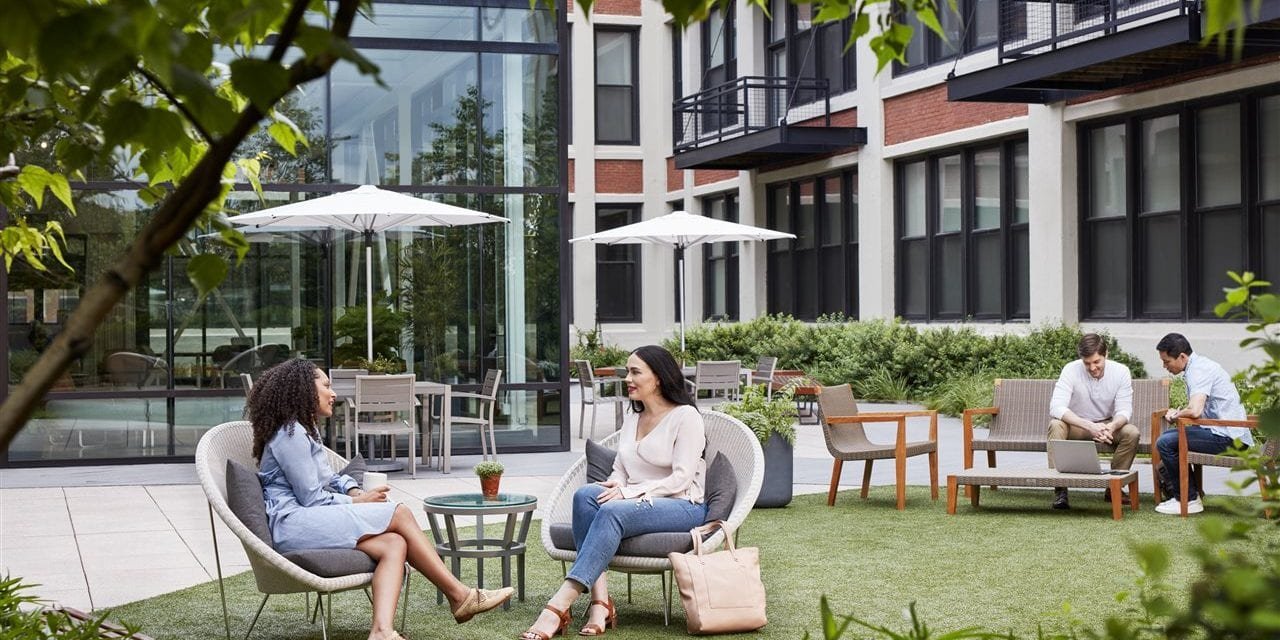From standing desks and team-building events to onsite services and remote work opportunities, companies have adapted over the years to adopt new solutions that will grow their company, improve employee retention and increase productivity.
However, while all of these initiatives have their benefits, John Scott, senior workplace design strategy expert for Haworth, points out many companies are missing one key solution — an opportunity that exists all around them. The chance to enjoy the fresh air and take their work outside.
“With so many design trends to focus on, the one that almost always gets overlooked is utilizing the outdoors to work and collaborate,” Scott says, adding that the benefits of outdoor work extend beyond physical wellness. There are several benefits to a person’s total well-being as well, including the following.
* Improved focus. Yes, we’d all love to believe that we can commit to eight solid hours of work every single day, but the truth is it doesn’t happen and in many cases that productivity slips as the day goes on. Working outside, however, has been shown to improve workplace focus and can restore cognitive and physical energy to dive back into a project. In fact, research appearing in the book Your Brain on Nature shows that spending time outdoors can lead to increased motivation, improved memory and reduced mental fatigue.
* Take an eye break. Too much screen time isn’t solely an issue for teenagers. Adults can face this challenge as well, especially those who focus on a computer screen as part of their job every single day. However, taking a break outside or working outside allows for a respite from the constant screen time. Take a moment to look away from the screen and toward a tree or bush in the distance and it will provide just the break your eyes need.
* Relax your brain. Work can be stressful but spending time outdoors — whether at work or not — has been shown to release certain chemicals in the brain like Gamma-Amino Butyric Acid that work to calm your mind. So, if a certain project is giving you difficulty, taking it outside can help you tackle it in a more rational, calm way.
* Increase and harness creativity. Creativity and innovation are critical objectives that many companies are racing to better understand and realize in order to lead their markets and industries. For these elements to flourish, work space should protect its employees’ ability to focus, collaborate effectively and support the ideal creative rhythms within an organization. Harvard physician Eva M. Selhub, co-author of Your Brain on Nature, says spending time outdoors allows the higher brain centers to be accessed, resulting in increased concentration, improved memory, greater creativity and productivity, and reduced mental fatigue. Work is too often done within the constraints of four walls, and stepping outside of that literal and figurative box can create unique settings for inspiration and creativity.
* Better for the team. The natural social tendencies of working outside have been shown to increase team engagement as team members no longer feel confined to boring meeting rooms or that they must be quiet in their office space. Walking meetings have also been shown to support more effective team collaboration by eliminating smartphone and other distractions during the meeting. In fact, research from Stanford University shows a person’s creative output increases by 60 percent when they walk.
Starting such initiatives in your business
The benefits of working outside are considerable but how do you start applying them in your office? Investing in an outdoor seating space employees want to use is an important first step. From there management needs to encourage its use — employees need to know it’s OK — and maybe even use it themselves to get the process moving.
Walking meetings are even easier to start. Simply grab a co-worker and decide that your weekly meeting will be held mid-stride. Other co-workers will eventually join you and before you know it, your office will be healthier and more productive because of it.
(BPT)
















